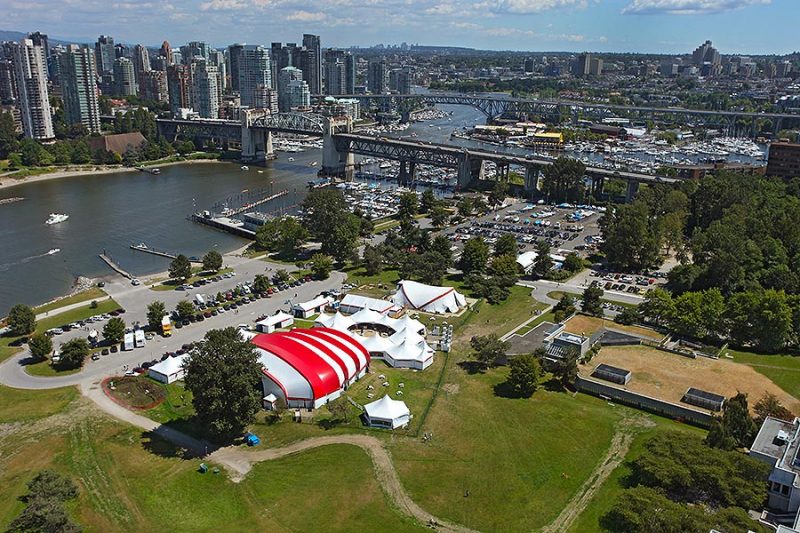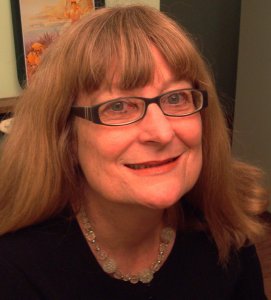#157 From stage to page
First published Aug. 16, 2017
REVIEW: All the World’s a Stage: The Story of Vancouver’s Bard on the Beach
By Jayne Seagrave
Victoria: Heritage House, 2017.
$29.95 / 9781772031768
Reviewed by Ginny Ratsoy
*
In All the World’s a Stage, Jayne Seagrave has provided a history of Bard on the Beach, Vancouver’s well-known outdoor Shakespeare festival.
Founded in 1990 with a production of A Midsummer Night’s Dream that attracted summer audiences of 6,000 to its rented tent, the Bard on the Beach Theatre Society now produces four of Shakespeare’s plays a year at its two outdoor stages in Vancouver’s Vanier Park, with a backdrop of English Bay and the North Shore Mountains.
Audiences totalling 100,000 now attend 200 performances across the four months of summer. Reviewer Ginny Ratsoy admires All the World’s a Stage for its valuable account of Bard’s production history and for pulling back the curtain to reveal some administrative details; outlining production sites, actors and other personnel, as well as Bard’s impressive educational outreach. But Ratsoy notes that all theatre companies require such commitment and infrastructure and this book lacks a wider, Canadian theatrical context. “Virtually any theatrical venture in Canada is brave and admirable,” she writes. “from regional theatres to alternative troupes.” – Ed.
*

Reviewing Jayne Seagrave’s All the World’s a Stage: The Story of Vancouver’s Bard on the Beach allows me to step outside of my areas of expertise. My publications on theatre are on non-mainstream, Indigenous, and Intercultural Canadian work. My research on cities focuses on small cities such as Kamloops, where I live. I welcome this chance to glimpse into Shakespeare (whom I have studied and taught, but who is removed from my academic interests), Vancouver (which I know as a visitor), and Bard on the Beach (which I attended several years ago.)
Similarly, Seagrave is departing from her usual occupations, living up to her self-description as an “eclectic woman.” A specialist in travel writing (particularly camping and solo female travel), she is also an entrepreneur and marketer (as director for the Vancouver Tool Corporation). A long-time fan of Bard on the Beach, and an emigrant to Canada (from England), Seagrave is interestingly placed to write a history of the theatre company.

This book communicates her adoration of Bard on the Beach and its founder and leader, and is likely to be of interest to those looking for behind-the-scenes descriptions of day-to-day theatrical operations as well as those passionate about all things Shakespeare and Bard on the Beach in particular.
Handsome, neatly organized, and accessible to a general audience, the book teems with photographs showcasing the Vancouver landscape, Vanier Park, and productions from Bard’s inception in 1990 to the present. All the World’s a Stage affords the company an opportunity rare for theatre companies: to publicize its archives beyond the walls of a building or a website.
Seagrave employs a dramatic pattern of organization: the chapters are arranged into five acts (complete with scenes) that are complemented by a foreword, prologue, epilogue, and appendices. Liberally sprinkled with Shakespeare’s words, Seagrave’s book is easy on the eyes and ears.

Act One: Scene One, entitled “The Protagonist: Christopher Gaze,” establishes Gaze as the full-blown hero that he remains throughout the text. All the World’s a Stage: The Story of Vancouver’s Bard on the Beach is as much about Gaze, whom Seagrave sees as charismatic, as about the company.
In Act One, Seagrave chronicles Gaze’s “blue-blood” upbringing in England, his theatrical apprenticeship there and in Canada (where he arrived at 23), Douglas Campbell’s influence on him, and the inception of Bard on the Beach. After interviewing over forty people, she concludes, “everyone I spoke to loves Christopher Gaze.”

The remaining chapters provide a production history, an examination of the company’s administrative and production sites, a detailed overview of Bard participants (from the actors through the administrators, board, staff, and audience) and a description of the company’s multi-pronged educational outreach.
The epilogue summarizes Seagrave’s take on the reasons for the company’s success — a “family” culture, sound finances with a budget heavily supported by patrons, accessibility through education and low ticket prices, and a convenient, clean, and attractive location.
These chapters inform readers about the many components of play production — from what precisely the set designer does to the various roles for the approximately 250 Bard volunteers. Seagrave is particularly to be commended for recognizing the fundamental part that volunteers, to whom she dedicates the book, play in theatre companies.

Seagrave effusively praises virtually every aspect of Bard on the Beach — from its productions to its refreshments. Bard is repeatedly referred to as “unique” and compared favourably to other (unnamed) theatre companies: it is more accommodating of its actors (p. 136), it provides a longer rehearsal period (p. 130), it has better attendance (p. 157), Gaze is “very different to other artistic producers in Vancouver (p. 177),” and attending its performances is a “one-off” (p.116).
While a company that has sustained popularity for almost thirty years, survived despite few grants and a lack of Canada Council support, and coped with the vagaries of outdoor theatre in rainy Vancouver clearly has much going for it, I found the constant praise wearisome, particularly when it came at the expense of those anonymous companies.
Virtually any theatrical venture in Canada is brave and admirable — from regional theatres to alternative troupes. As Anne Nothoff and Gaetan Charlebois state in The Canadian Theatre Encyclopedia, “Every year, new indie theatre companies are created by graduates from Canada’s theatre programs … most with … courageous, talented actors, directors, and designers.”

Theatre Passe Muraille, Native Earth Performing Arts, Teesri Duniya, and Vancouver’s own Theatre for Living, to name but a few, have succeeded by presenting original and often experimental works that reflect diverse Canadian experiences.
In 2016, Seagrave notes, “77 percent of Bard’s income was earned revenue (ticket sales, gift shop, concession) 16 percent was gained through fundraising, and only 4 percent from government grants.”
The company is fortunate that so many apparently well-healed patrons are willing to support the theatrical status quo. However, the book would have benefitted from less adoration and a more informed comparative context.

That said, All the World’s a Stage: The Story of Vancouver’s Bard on the Beach is an interesting addition to popular writing on Shakespeare and a useful account of the operations of one of British Columbia’s largest companies and its relationship to its city.
Seagrave’s venture into writing about west coast theatre is sure to be a hit with Bard fans.
*

Ginny Ratsoy is an Associate Professor of English at Thompson Rivers University specializing in Canadian literature. Recent courses have included British Columbian Literature and The Environment in Canadian Literature. Among her publications are Playing the Pacific Province (Playwrights Canada Press, 2001, co-edited with James Hoffman) and Theatre in British Columbia (Playwrights Canada Press, 2006). She has also co-edited (with W.F. Garrett-Petts and James Hoffman) Whose Culture Is It, Anyway? Community Engagement in Small Cities (New Star Books, Limited, 2014), and published articles on theatre, playwrights, and small cities in British Columbia.
*
The Ormsby Review. More Readers. More Reviews. More Often.
Reviews Editor: Richard Mackie
Reviews Publisher: Alan Twigg
The Ormsby Review is a new journal for serious coverage of B.C. literature and other arts. It is hosted by Simon Fraser University. The Advisory Board consists of Jean Barman, Robin Fisher, Cole Harris, Wade Davis, Hugh Johnston, Patricia Roy, David Stouck, and Graeme Wynn.
—
BC BookWorld
ABCBookWorld
BCBookLook
BC BookAwards
The Literary Map of B.C.
The Ormsby Review
